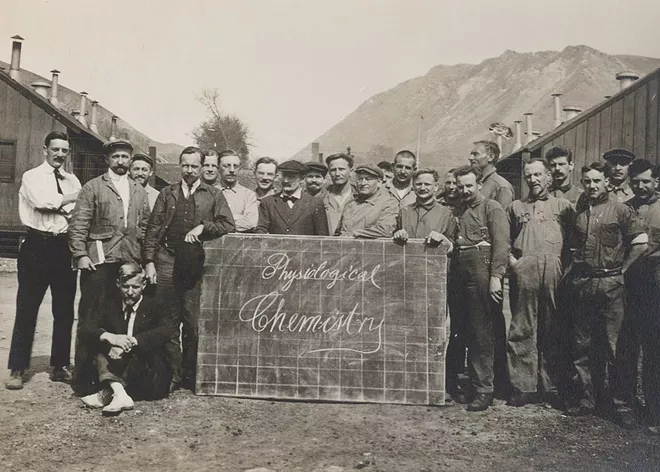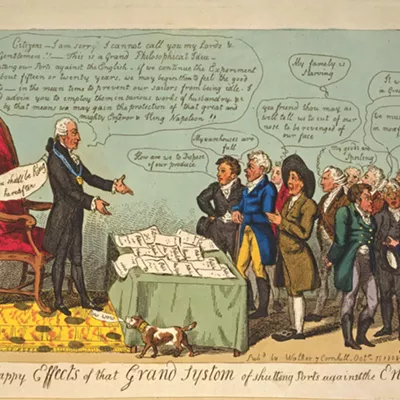
The Espionage Act is in the news with the June indictment and arrest of former President Donald Trump for his handling of classified material after leaving the White House in 2021. He is not accused of spying, which can be a little confusing given the name of the Act he is being prosecuted under. Yet, even during its early years, the Espionage Act covered an ever-widening range of behavior beyond spying that was said to put the nation's security at risk.
The Act was passed into law in 1917 just after the U.S. entered World War I. It was a time when alarm over immigrants and "enemy aliens" and acts of terrorism targeting the homeland was at a fever pitch. In 1918, the Act was amended to include sedition, which, into the 1920s, was used to justify political harassment, book banning and disloyalty, among others.
Many Trump supporters contend that the Act is being employed in this case for a political hit job. Yet the indictment unsealed by Department of Justice special counsel Jack Smith effectively paints the former president as a security risk. Whether his actions merit punishment will ultimately be up to a jury. What we do know for certain is that more questionable cases involving the old Espionage Act resulted in convictions. And a number of those occurred in the Pacific Northwest during the early days of its enactment.
The Act was partly a response to a prewar terror campaign by the German government, which was conducting a shadow war on American soil as early as two years before the U.S. engaged in the overseas conflict. In May 1915, for example, a massive explosion off Seattle's Harbor Island and a railcar fire in Tacoma were widely regarded as acts of German sabotage to prevent supplies and war materiel from being shipped to Germany's enemies. Those shipments were intended for Vladivostok in Russia, then an ally of Britain and France against Germany.
The Pacific Northwest was considered to be of strategic importance at the time. West Coast ports and shipping were potential targets for sabotage. The docks and shipyards were stocked with socialists, trade unionists and immigrant workers suspected of wanting to monkey-wrench the capitalist supply chain.
Washington state formed a kind of soft underbelly to British Columbia in Canada, which was already at war with Germany. The Act gave the U.S. a tool to use against agents and spies who might work across the border.
Then, during U.S. involvement in the war, the Act protected important installations like the Naval shipyard in Bremerton, essential to the war effort along with Puget Sound's private shipbuilders. Points around the Salish Sea bristled with forts and gun emplacements, like Fort Worden near Port Townsend, to protect shipping. Lumber for the war effort was harvested and milled here for the national defense and sent to allies.
Early revisions to the Espionage Act expanded its reach to include anyone thought to undermine the American war effort. Legitimate concerns quickly merged with ethnic prejudice and public hysteria to crack down not only on saboteurs, spies and German sympathizers, but anyone who voiced opposition to the war effort.
As a result, the Act allowed the arrest of people who opposed the war and military draft and recruitment, who espoused socialist views or who were members of the militant Industrial Workers of the World (I.W.W.), a group considered by authorities to be inherently anti-American. Simply being German — an "enemy alien" — or sympathizing with Germany was enough to justify arrest. Some 4,000 Germans and German-Americans were interned during the war along with another 1,000 POWs, many of them German captured sailors. The number of internees from Seattle is not exactly known, but by the end of 1918 was estimated to be several hundred, according to The Seattle Times. Those seized in Seattle were shipped to an internment camp at Fort Douglas in Utah.
Un-interned "enemy aliens," adult men and women, were forced to register with the government and carry ID cards, and were banned from coming near shipyards, military installations and other strategic points on Puget Sound. The Seattle Chamber of Commerce cheered such restrictions, and those who violated the ban were arrested.
The government sent Clarence Reames, a federal prosecutor, to Seattle to specifically enforce the Espionage Act and other laws related to draft resistance, food hoarding, immigration and sedition.
Here are a few examples of those in the Puget Sound area who came under suspicion:
Miss August Minnie Deckman, a Seattle woman, was accused under the Espionage Act of trying to smuggle messages to her German fiancee, Ernest A. Leybold, a suspected German agent arrested in Seattle, and to plot to free internees at Fort Douglas. After much publicity and a subsequent trial, she was exonerated for lack of evidence. Immediately after being acquitted, Deckman was taken into custody to be interned as an enemy alien at Fort Douglas.
A farmer, state Grange "master" and progressive political activist with the Nonpartisan League, William Bouck of Sedro-Woolley, was indicted, arrested and sent to prison for giving a speech in Bow, Wash., in 1918 claiming that the cost of the war would mortgage the future of the nation's children due to the $100 billion bill that would result if the war lasted three more years. Bouck soon resumed his political activities, but was deposed from his Grange position for a speech given in Colville that was considered "unpatriotic."
In 1919, more than a year after the Armistice, four members of the editorial staff of the labor newspaper, the Union Record, were arrested, including activist Anna Louise Strong, and faced multiple counts under the Espionage Act for undermining the government by opposing the draft. Attorney John Dore, later Seattle mayor, defended the accused, arguing that since the war was over, there was no war effort to undermine.
A farmworker, Henry Brauer of Whatcom County, was arrested in July 1918 and charged under the Espionage Act for refusing to donate to the Red Cross, allegedly saying "To hell with the Red Cross. Let those lazy fellows who have gone to France come back and go to work." He claimed he was too poor to donate. He had $2,000 in the bank, however, which was put toward his $5,000 bail bond.
An Everett rancher, Frank Shaffer, was charged with violating the Espionage Act for having a banned book of Bible teachings, The Finished Mystery by Pastor Russell. The book was alleged to carry German propaganda for its pacifist message and a passage against war with Germany, reflecting teachings of the Jehovah's Witness sect. Shaffer had some 1,000 copies of the book for distribution to members of the International Bible Students' Association. He was sentenced to two years at McNeil Island and his conviction was upheld by the U.S. Supreme Court in 1919.
The Espionage Act was eventually revised and trimmed back in its aggressive violation of First Amendment rights, but its wide-net approach fueled the early 20th century's "Red Scare." It was also followed by broader and more restrictive immigration laws.
The government had concluded by the World War II era that it had overreacted against German immigrants and German-Americans during WWI. This may have contributed to the fact that it took the government years to put a priority on investigating pro-Nazi domestic groups in the 1930s over chasing communists, for example. And while under 12,000 Germans and Italians were put in camps during WWII, the mass incarceration of over 100,000 Japanese and Japanese Americans at the same time, including entire families, based on race alone, offered a contrast reflecting long standing racial bigotry.
The history of the Espionage Act is rife with controversy. While the lawmakers who created it sought to address real threats to national security, they also perhaps unwittingly created Exhibit A in the case against government overreach. Despite the narrowing of the Act, those who stand with Trump no matter what might draw on that history to defend the former president, even if the prosecution convinces the jury that his actions put the nation at risk in an unprecedented way. ♦
Knute "Mossback" Berger is editor-at-large for Crosscut.com, where this first appeared.























